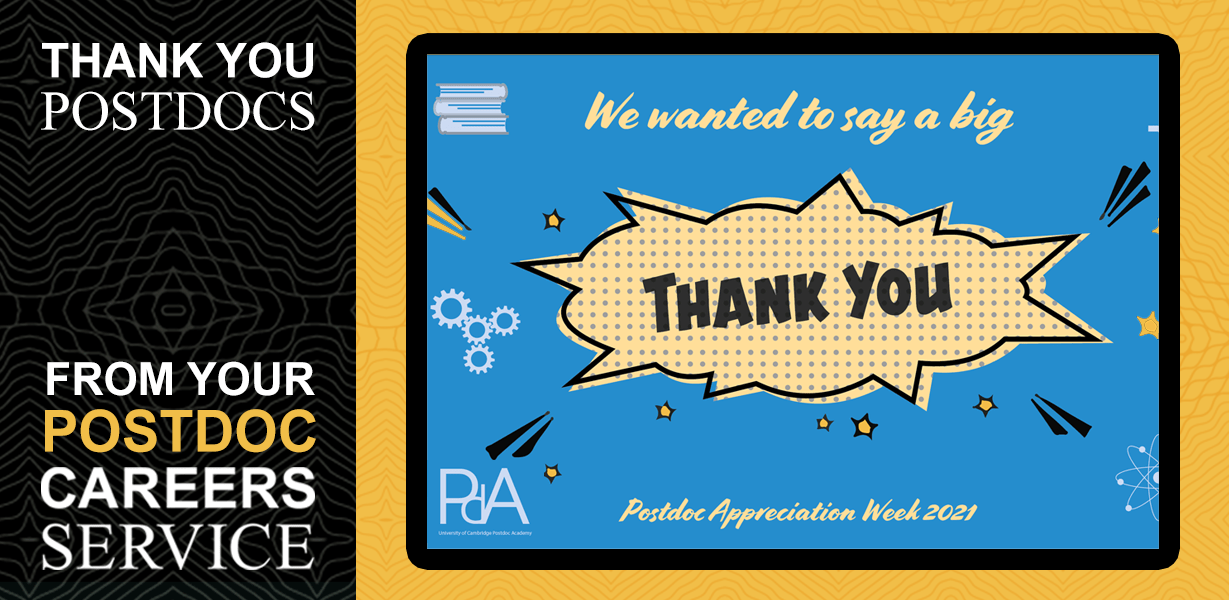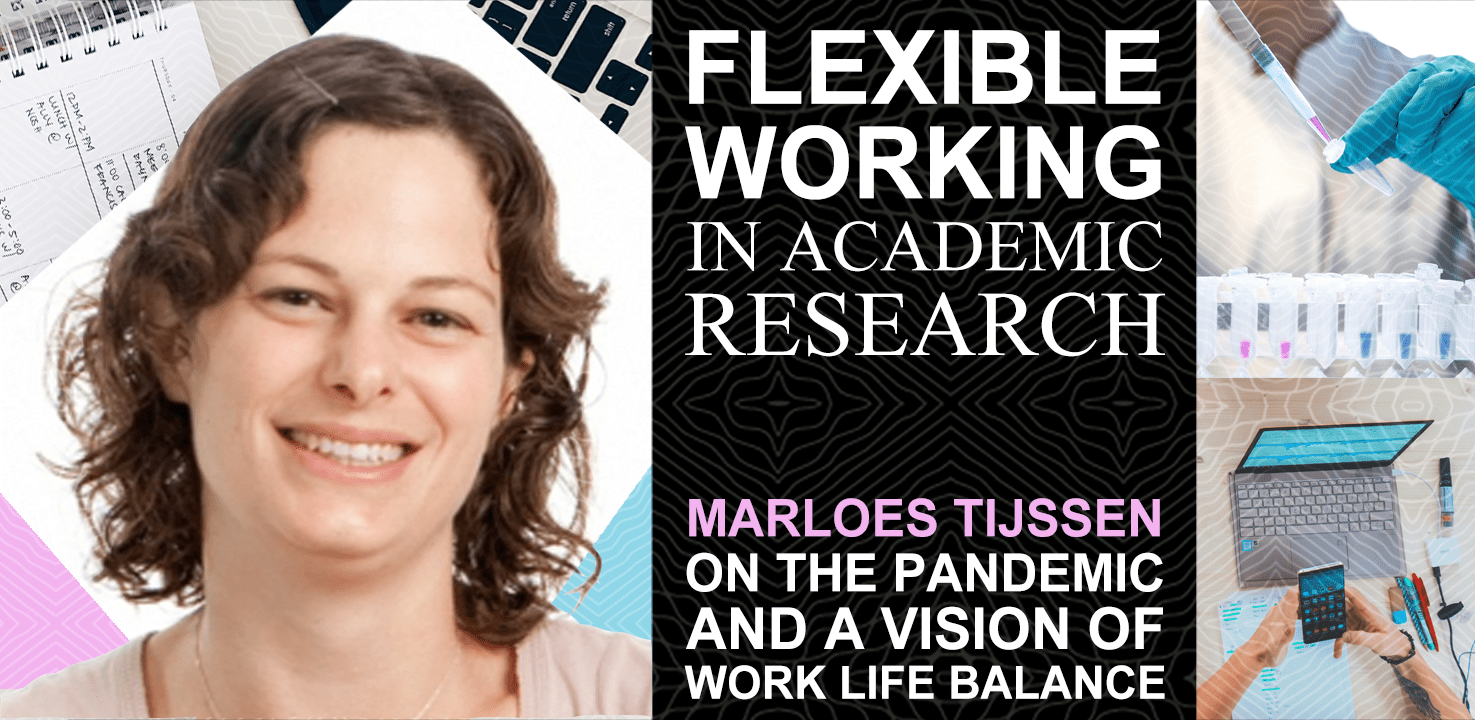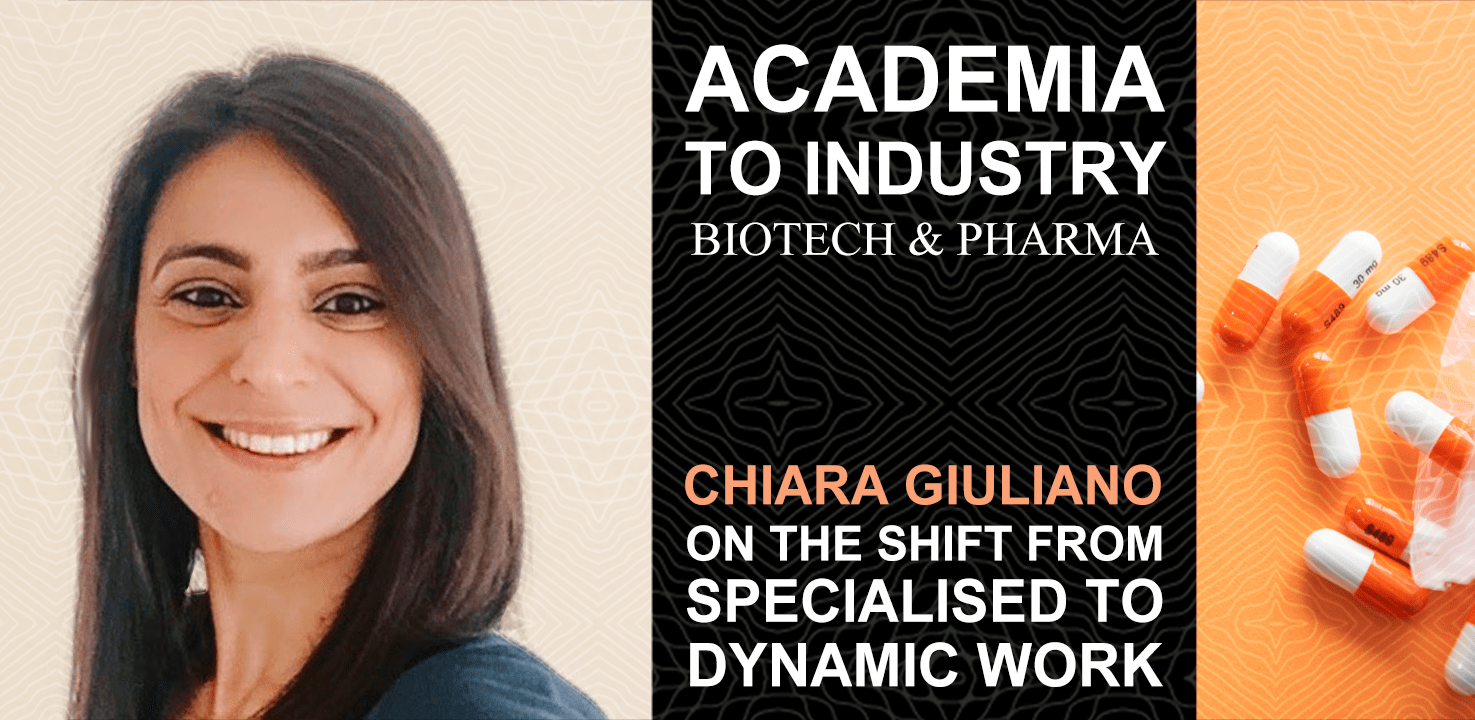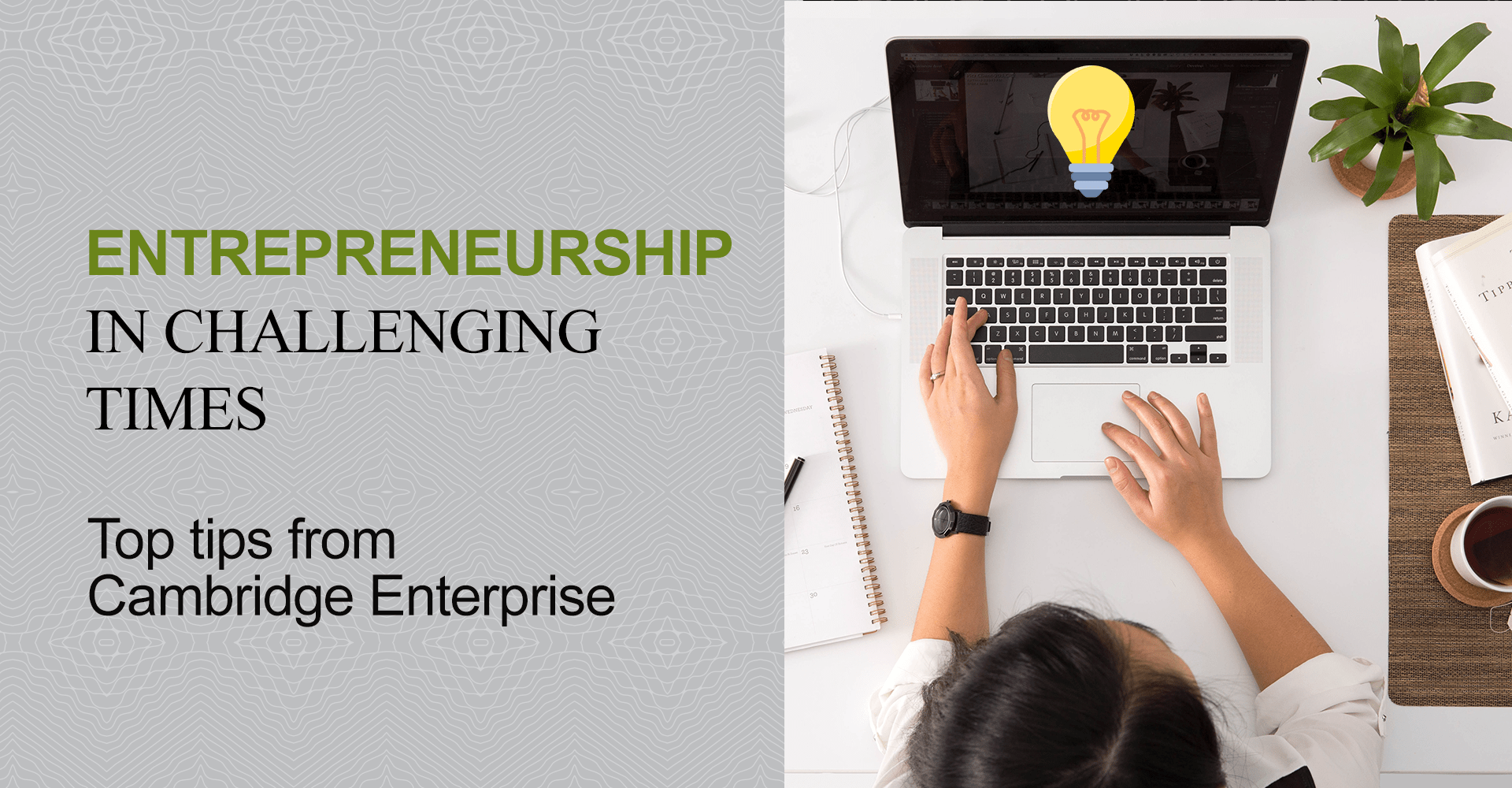Thank you, Postdocs! – Postdoc Appreciation week 2021
Insights from lockdown: flexible working in academic research is possible!
Marloes Tijssen talks through her experiences of successfully running a research group that promoted flexible working and a culture of feedback – long before the pandemic. With reflections from others, this blog aims to show you that flexible working can work for many people.
Academia to Industry: Chiara Giuliano on the shift from specialised to dynamic work
Aled’s fellowship story…at a glance
Dr Aled Parry is a Welcome Trust Sir Henry Wellcome fellow at the Babraham Institute. In his short podcast with the Postdoc Careers Service, Aled talks about his journey from PhD to fellowship holder. Although Aled’s PhD is from CRUK-CI, his first degree was at Bath. Aled describes the process of finding a suitable idea to work on, identifying funders who might be prepared to back it and the time and commitment it took to finally secure his fellowship
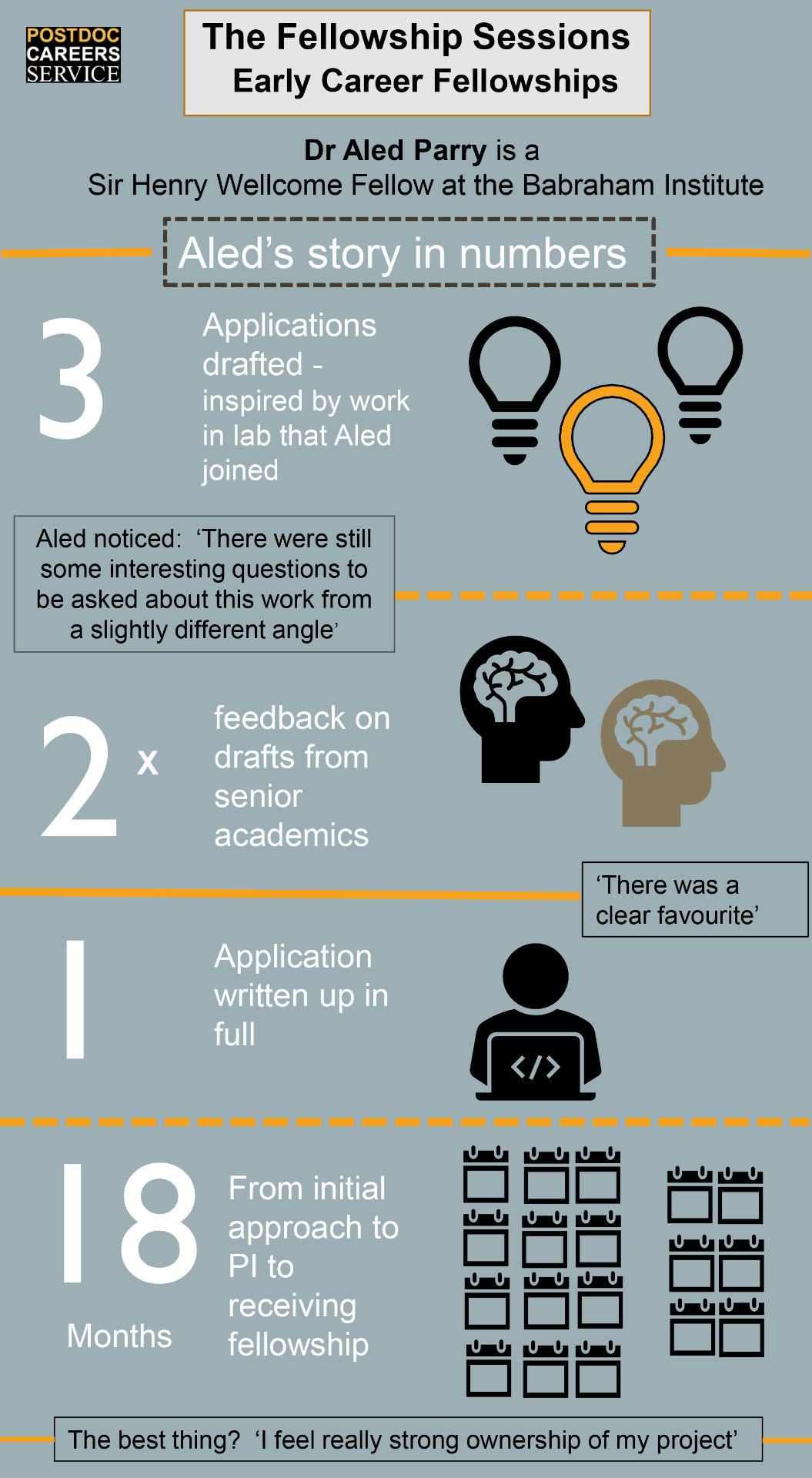
Aled’s podcast is one in a series making up The Fellowship Sessions – a mix of on-demand content, virtual live panels with fellowship holders and senior academics, and a virtual Funders’ Fair which only happens every 2 years. To hear more, visit the playlist on the Careers Service’s YouTube channel.
Aled is a guest panellist at a live virtual panel on 14th January on early career postdoc fellows, book now to join him and fellow panellists.
Entrepreneurship in Challenging Times – top tips from Cambridge Enterprise
Jennie Flint, Senior Commercialisation Associate at Cambridge Enterprise, shares her top tips for budding entrepreneurs during the pandemic
Academic Recruitment: Tricky interview questions
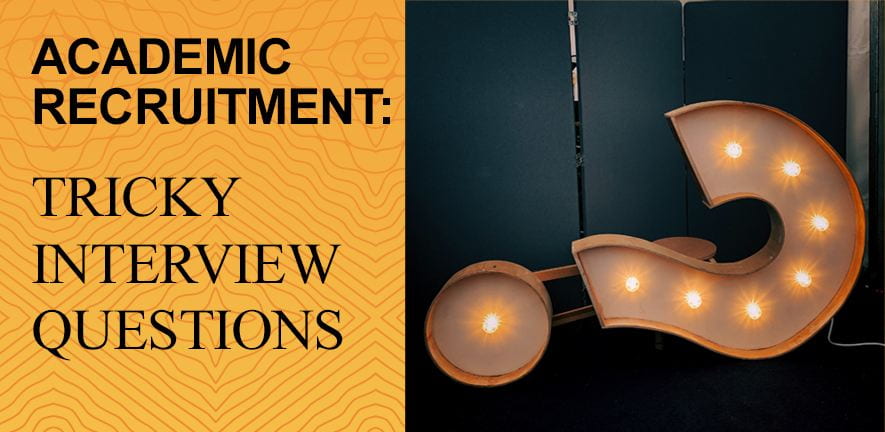
Interviewing for group leader/faculty positions – what are your selectors’ concerns?
At a recent workshop on interviews for group leader/faculty positions, STEM postdocs were asked to share any tricky interview questions they had been asked or had heard about.
Participants came up with the following questions. For the ones that had most interest, I have tried to address why an interviewer might ask this, and what preparation you could do to be ready for something similar.
How will you contribute to the university outside of your research?
UK higher education is a marketplace. What are the university’s priorities right now and how can you help them achieve them? Get insights by looking at how the university presents itself (on its website) to prospective students. Are they still trying to fill places? Are they keen to increase diversity or to support students with mental health difficulties? For UK universities, find out more about their students’ typical educational backgrounds and what they like/dislike about their course (for example, whether they feel they get timely feedback) from the Discover Uni website. Once you know the context, you can come up with examples to show how you could engage with the university’s top concerns.
What is your mentoring approach for Master or PhD students?
They are asking this because they want you to be able to support your students and for them to submit on time and pass (important for future funding). Think about any mentoring you have done to date – what worked and what didn’t. If you have never mentored others, what has your experience (and your peers’) been as mentees?
What are your plans for attracting research funding in this role?
They want to know you have already thought about this. Know what your first (and second) grant application would be and where (and when) you would apply.
If you have been shortlisted, they must have seen something in you
How will you ensure that your research will be impactful?
Recognise what impactful might mean to them – refer to the job advertisement. In the UK, familiarise yourself with the REF definition and look at a range of REF case studies in this institution and others who may be doing related work in your field.
Who are your main competitors?
They want to know that you are familiar with the field but have a niche. You should be able to say something like: my current supervisor’s focus is on x and Dr B at 1111 is also working in my field but with an interest in y, but my own work will address z (which needs to be sufficiently distinct from x and y to attract additional funding).
New lecturers often struggle with the load of teaching in their first year. How will you manage this?
Try to find out before (or in) interview what the expectation is (often reduced for appointees new to lecturing). The key word is ‘manage’ – how do you manage conflicting pressures currently? Is there anything you could drop to focus on grant applications and teaching?
You have not published many original articles in the last year. Why are you a strong candidate?
If you have been shortlisted, they must have seen something in you. Your answer should reflect your value to them – are you bringing new methodology, can you generate lots of undergraduate projects? You may be able to point to exciting unpublished results that are waiting on further experiments/collaborators/patent applications – update the panel on any new outputs since you applied.
Interviewers will be impressed if you are up to speed with the latest challenges facing them
What do you understand by leadership?
They are asking this because they want to recruit someone with leadership potential. Think about people you admire for their leadership. What qualities have they shown? (use traits that you can also demonstrate in yourself!) If you have had leadership roles beyond the lab, think about how you could transfer the skills, for example, if you have experience of coming up with a strategy for an outreach activity, or motivating and encouraging sports team members, you may be better placed to lead your research group.
Would you encourage a student to pursue a formal complaint of sexual harassment?
They may have had a recent issue and be testing whether you are aware that policies should exist and need to be followed. You need to show appreciation that this is a serious matter, that you would listen to the student but also seek advice from senior staff and/or HR and refer the student for appropriate support for example, student union, counselling.
***************
Keep up to date with topical issues to impress at interview
Interviewers will be impressed if you are up to speed with the latest challenges facing them. Cambridge University postdocs can use the University’s subscription to the Times Higher Education magazine to keep abreast of issues in Higher Education. New, topical, concerns for academics include:
- How many students can they accept? The cap on the number of students UK universities can recruit has been removed, and France and the Netherlands have also recorded higher pass rates in school-leaving exams.
- If they let in students who might not have qualified in previous years, how can they support them?
- How has the pandemic affected their university’s appeal to international students?
- How much of their teaching will need to be delivered online?
- Do they need to adapt the curriculum in the light of BLM?
- Will the UK join Horizon Europe?
***************
I’ve posted some other popular questions below. Why not use the Comments box below to share why you think an interviewer might ask this, and what preparation you could do?
Have you had any conflict in your last position? How did you manage it?
If offered, would you accept this position?
Given that you lack formal management experience, how would you approach managing and motivating a research team?
What would you do on your first day in the job?
How would you motivate first year undergraduate students in your discipline?
By Sally Todd, Postdoc Careers Adviser
Academic Recruitment: Chalk Talks

You’ve been asked to give a chalk talk as part of the interview process for a long term academic role. Your mind is probably buzzing with questions – how do I structure it? what should I include? how long should it be? and what is the point of including it anyway?
To help answer these questions, Prof. Jason Carroll, a speaker at a postdoc event, gave a talk addressing these common concerns.
Why a chalk talk?
Although the chalk-talk isn’t always required, it is an important part of the recruitment process in many institutions. You need to prepare for it as fully as the research seminar and other parts of the interview.
The panel will be observing how you respond to getting your work pulled apart constructively. When you are interrupted, do you get flustered? Can you think on your feet?
It is a chalk talk, not a Powerpoint presentation
Don’t turn up with a slide deck – you will be using a whiteboard and marker pens or a blackboard and chalk. It might sound informal or an afterthought but it’s not. Jason said it’s tough, even for group leaders, referring to it as: ‘The dreaded chalk talk’. He was careful to stress, though, that no one does it perfectly. So, If you are feeling nervous, you are not alone.
Talk about your future plans…
Don’t dwell on your story to date, the panel want to know about your future project and how you will carry it out. Outline your five year plan clearly and succinctly.
Ensure that you get your key messages up front
Knowing that you will be interrupted means that you need to stay at a high level. Ignore the specifics, such as details of the experiments that you intend to run.
Jason suggests an opening such as ‘I am going to be looking at x in the context of y, and here are my three goals.’ He suggests that the three goals should be broken down into safe, medium and higher risk objectives. These goals should not be interdependent – if one goal fails you should show that plans will be flexible enough for your research to continue.
Don’t dwell on your story to date, the panel want to know about your future project and how you will carry it out.
Make sure that these aims are realistic within the timeframe. Also, ensure that the plan fits with the remit or goals of the institute/department.
Don’t come across as dogmatic. As the project progresses and the scientific landscape changes you need to be able to show to the panel, through contingency planning, that you will be able to adapt to these inevitable changes.
Worried about forgetting information? You can use a cheat sheet to remember key figures. Just don’t copy it out onto the whiteboard.
Remember that you are going to be leading projects for multiple people
Make sure you can justify the composition of your lab. Why do you need a clinical fellow, technicians or a lab comprised solely of postdocs? How will this change during your research?
Think about the questions you might be asked and practice answering them
These may include:
What is you first project going to be?
Why you?
Why this institute?
Who are you going to work with from within the institute?
How will you measure success?
Where are you going to get grants from?
What differentiates you from your Postdoc supervisor?
Can you bring your research with you or will you be starting from scratch?
Be excited
Be enthusiastic about your work and what you can offer the institute. Understand your audience. Also think about what the institute can offer you.
You need to come across as a good fit. In addition to good research, the panel want to select the best colleague – you will probably be spending a lot of time together.
Chalk talks are not just for interviews
In fact, the chalk talk in front of peers is often a regular and important exercise for group leaders at an institution even though, as Jason says, it doesn’t feel like it at the time! You’ll get brilliant minds offering you input on your work, So, it is a useful skill to have if you are planning an academic career.
For more info on academic careers
By Heather Smith
Working as an academic at a teaching focused university
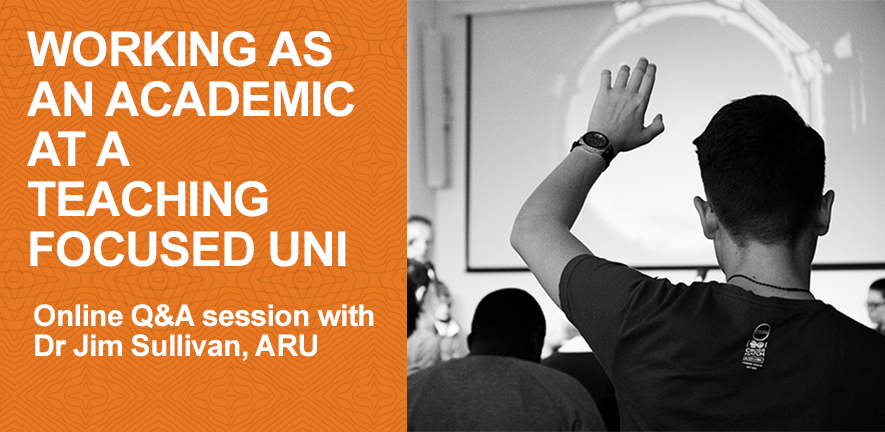 We recently hosted an inspiring speaker – Jim Sullivan – a former Cambridge postdoc who worked as a lecturer at Queen Mary University of London, a senior lecturer and now a Director of Studies at our neighbouring Anglia Ruskin University (ARU). Jim gave some great insights on what it’s like and how to get in. Here are some highlights.
We recently hosted an inspiring speaker – Jim Sullivan – a former Cambridge postdoc who worked as a lecturer at Queen Mary University of London, a senior lecturer and now a Director of Studies at our neighbouring Anglia Ruskin University (ARU). Jim gave some great insights on what it’s like and how to get in. Here are some highlights.
Teaching ‘focused’ unis might not want to see themselves this way
At the Postdoc Careers Service we bandy about terms such as ‘research focused’, ‘research intensive or led’ and ‘teaching focused’ unis. While these terms have their use as broad brush definitions when you are researching future employers, our speaker pointed out that teaching ‘focused’ unis might not want to see themselves this way. While they are teaching focused—they literally have a lot of taught students relative to researchers–these institutions aspire to be more research led. So take care using our indelicate definitions when talking to future academic employers.
Over the last couple of decades, teaching was perceived as a poor relative of research, but the arrival of the Teaching Excellence Framework gave it a ranking boost
Teaching’s profile has increased
Over the last couple of decades, teaching was perceived as a poor relative of research, but the arrival of the Teaching Excellence Framework gave it a ranking boost. Suddenly universities’ teaching was being formally assessed and graded nationally, a situation that schools have long lived with. As a seasoned lecturer, Jim said that he has seen a shift in the recognition over the past years. The true value in good university teaching is being recognised, and that’s rewarding for the committed lecturer.
Teaching experience is important but it’s not always a deal breaker
At lectureship entry level, formal HE classroom teaching experience isn’t a must but the potential to be a good university teacher is. This is assessed at interview so make sure you pitch your practice lecture for 2nd year undergrads if that’s what they asked for, not for 3rd or 1st years. Experience of lecturing and giving tutorials is a definite advantage and for senior lectureships, experience in course design is required. Being able to disseminate your knowledge of teaching practice and methods is key too. So if you have designed or done something new or different related to teaching – even if it’s not an official course–don’t keep it to yourself, share with colleagues and gain evidence that you’ve done this.
HE teaching qualifications come in different shapes and sizes
Your new employer will expect you to do a higher education teaching qualification when in post. School level teaching qualifications or a fellowship at the Higher Education Academy are acceptable alternatives. Check out the opportunities to gain HE teaching qualifications and experience while you’re at the University of Cambridge.
Research skills can inform teaching and you can propose new modules based on your research expertise.
You will bring valuable ideas with you too
You may feel that you’re too research focused. Jim stressed that you will be bringing valuable ideas to the table. Your research experience will be appreciated if it fits into the institution’s research agenda. Research skills can inform teaching and you can propose new modules based on your research expertise. Research into good teaching practice – pedagogy – is sought after and might be a nice change from your current research field. Don’t forget you will have student projects related to what you teach on the go–undergrad final and masters –which will help push your research agenda.
Jim sees academic roles being a tripartite of research, teaching and administration.
University employers will love your inner administrator
The stereotype of the chaotic academic belies the importance of strong admin skills and how attractive they are to academic employers. ARU were very interested in Jim’s admin experience in health and safety at Queen Mary, and not long after he joined ARU, he became the biological safety officer writing uni policies in H&S. Another recent speaker Catarina Gadelha of the research led University of Nottingham agrees. Catarina has tons of teaching experience but you know what made the difference in her opinion? The ‘unusual’ –unglamorous teaching admin. She trained new tutors unfamiliar with the tutorial system, supported open days, attended committee meetings. “Those activities really impressed the Nottingham panel”, she said, “because teaching administration is much more important to a university! “
Not all lectureships are the same in the same institution
Jim sees academic roles being a tripartite of research, teaching and administration. Indeed a lecturer role in his institution can be based on varying proportions of any of the three e.g. 75% admin, 25% teaching. Promotions happen across all combinations and are not solely aligned to research output. Not that those years training are wasted if you don’t do much research. Jim finds his research skills – information finding –strengthens his effectiveness in academic admin.
How to get experience and a foot in the door
Owing to its organisational complexity, getting lecturing experience isn’t easy at the University of Cambridge, so looking at ad-hoc lecturing at other institutions is an option worth considering. ARU have associate lecturer roles – teaching on fixed hour contracts or marking assessments. They’re rarely advertised so you are advised to send a CV to the relevant head of School. And don’t let short-term contracts, eg maternity cover, put you off. It’s a foot in the door which usually leads to longer term options
If you don’t like it, you can leave
A teaching focused job might feel like a radical move from a postdoc at a research focused uni. If you think you’ll like teaching and all the rewards and complexities it brings, try it, says Jim. If you decide you don’t really like it, you are not stuck there.
By Anne Forde
Handshake – a guide for postdocs

As a postdoc, you might be wondering how to utilise Handshake Cambridge – the new digital platform recently launched to connect with the Careers Service.
Whether you are thinking of pursuing academic research or looking for opportunities beyond the ivory tower (or both!), we wanted to make sure you were on track to making the most of this innovative careers development platform.
In a hurry? You can book an appointment and complete your profile later…
Do you have an interview looming? Or maybe you need urgent help with a fellowship submission? Perhaps the deadline for a job application is fast approaching?
Do you have an interview looming? Or maybe you need urgent help with a fellowship submission? Perhaps the deadline for a job application is fast approaching?
When you first activate your Handshake account, you will be prompted to fill in your profile, which may seem daunting, and in ways, irrelevant to academic careers.
Don’t worry.
You can skip this step by simply pressing the “EXIT” in the top righthand corner, and then access the Careers Centre from the top menu bar, where you can book appointments, workshops and events. You can always return to filling out your profile later by clicking on “My Profile” under your initials.
Access postdoc careers workshops and events
We continue to offer a great range of workshops and briefings specifically tailored to researchers for careers in academia and beyond. Booking now takes place for all these activities through Handshake
Academic careers on Handshake
Handshake might look like it’s only for career options outside academia but it’s not. It’s a gateway to a rich range of academic career resources to give you the best chances to you present yourself.
Handshake might look like it’s only for career options outside academia but it’s not. It’s a gateway to a rich range of academic career resources to give you the best chances to you present yourself.
Through Handshake, you can quickly access our CV and Cover letters guide for PhDs and postdocs to help you prepare for interviews in academia and beyond . We’ll continue to add curated resources for you.
See what’s on offer outside academia and start connecting with employers
Interested in exploring ideas for careers outside of academic research?
Handshake Cambridge is an powerful tool to help you consider this.
As more people and organisations join Handshake, the opportunities to connect directly with employers and fellow postdocs and find jobs increase. And, of course, the more complete your profile is, the better chance you have of making relevant and useful connections.
Filling out your interests on your profile is also key to letting us, the Careers Service, know what areas you are interested in so that we can send your information about opportunities and information in the sectors you like (similar to the CamCareers emails in our old system.)
Be mindful of uploading an academically focussed CV as Handshake will autofill your profile using this information.
Be mindful of uploading an academically focussed CV as Handshake will autofill your profile using this information. Building a profile that highlights key elements of your research career and includes relevant activities and interests outside of your primary research focus is key to utilising Handshake to transition out of academic research.
For a step-by-step guide and tips, check out our blog post on building a great profile for students.
Register for Handshake now
Don’t hesitate to contact us through postdocs@careers.cam.ac.uk – our team is always ready to help you on your career journey.
Our Postdoc Careers Advisers are standing by to help you with your career.



